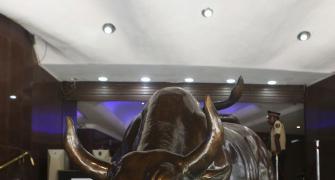 Some of India’s top business groups, including the Tatas, the Birlas and Mukesh Ambani’s Reliance Industries, have either sold assets abroad or asked bankers to find buyers this year, to service their debt and to exit from unprofitable businesses.
Some of India’s top business groups, including the Tatas, the Birlas and Mukesh Ambani’s Reliance Industries, have either sold assets abroad or asked bankers to find buyers this year, to service their debt and to exit from unprofitable businesses.
The Ahmedabad-based Adani Group was the latest to confirm on Tuesday that it had hired Morgan Stanley to sell its port project in Australia, acquired in 2011 for $2 billion.
The sale comes within weeks of Reliance Industries’ putting its 45 per cent stake in a shale gas joint venture in the US up for sale at a valuation of $4.5 billion.
“It’s a question of survival for many corporates.
"The debt taken by some companies to buy assets abroad had become unmanageable and they did not have any other option but to sell assets,” says Phani Sekhar, fund manager at Angel Broking.
Bankers say this year till date, the Tatas have sold their stake in Neotel in South Africa, apart from putting Tata Steel’s long products division on the block at a valuation estimated at $1.3 billion.
Bharti also sold its towers in Africa after demerging it from Zain’s operations it acquired in 2010 for $10.7 billion.
“This year is exactly the opposite of the boom witnessed in 2007-08, when Indian companies spent billions of dollars to buy companies abroad but failed to get reasonable returns on investments.
"The chickens have come home to roost as a lot of top companies are grappling with debt taken to acquire these assets,” said a banker about the spurt in sales of assets by Indian companies.
Apart from managing debt as in the case of Tata Steel and Lanco, which is selling a stake in its Australian coal mine, some companies are making the best of the good valuations fetched by their companies.
The Essar and Aditya Birla groups sold their business outsourcing units for $610 million and $260
“One of the ideas of selling the stake in the BPO operations was to use the cash to retire our debt and invest in new businesses,” said a Aditya Birla group executive.
“Besides, the BPO business was not core to the group,” he added.
D R Dogra, managing director and chief executive officer of Care Ratings, says the divestment of assets abroad is a part of the restructuring process.
“The business environment in the country as well as overseas has been downbeat in the last two years.
"This has caused companies to review their operations, especially offshore ones,” says he.
By rebuilding their strategies, those businesses that do not fit with the new whole are being sold off to improve the balance sheet and enhance shareholder value.
“Several of these acquisitions or partnerships were done at a time when global conditions were ebullient.
"Now with growth levels coming down and just about remaining stable such introspection has been called for.
"This is more so as some of these assets have not quite turned profitable and no longer fit in with the medium-term goals of the organisation,” he added.
Dogra says relatively attractive valuations of these assets could be another trigger for going ahead with such plans.
“Introspection is but natural when we are on the lower end of the business cycle when future strategies are reviewed and altered,” he adds.
Apart from business reasons, some groups like Adani are also facing opposition from environmental activists in Australia, which allege that its $16.5 billion coal mining project will destroy the Great Barrier Reef.
Many banks have refused to fund the projects, and the group is de-risking its strategy by selling its port project.










